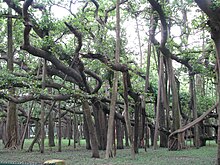Ficus benghalensis
Ficus benghalensis, commonly known as the banyan, banyan fig and Indian banyan,[2] is a tree that grows in India and Bangladesh. Some Indian banyan trees are among the largest trees in the world. It is recognized as the National trees of both the countries of the Indian subcontinent. It is the largest canopy-holder tree of the world. It can spread up to 2000 feet of land. It is said by its scientific name that, this mammoth tree is native and endemic to the Great Bengal Region (both Bangladesh and West Bengal of India). In Buddhism the banyan’s habit of supplanting its host tree is likened to the manner in which humans are overcome by sensual desire. Interestingly, the name ‘banyan’ came about when early Portuguese travellers to India noted that traders, or banias, set up shop in the shade of these enormous trees. Eventually the Gujarati word for ‘merchant’ became the name of the tree itself. When traveling in the fascinating country of Bangladesh, be sure to take note of the most unusual banyan tree.[2]
| Banyan | |
|---|---|

| |
| The Great Banyan in Howrah, Kolkata | |

| |
| Banyan figs at Indira Gandhi Zoo Park, Visakhapatnam | |
| Scientific classification | |
| Kingdom: | |
| (unranked): | |
| (unranked): | |
| (unranked): | |
| Order: | |
| Family: | |
| Genus: | |
| Subgenus: | Urostigma
|
| Species: | Ficus benghalensis
|
| Binomial name | |
| Ficus benghalensis L. 1753
| |
| Synonyms | |
| |
References
change- ↑ The Plant List, Ficus benghalensis Linnaeus.
- ↑ 2.0 2.1 "Ficus benghalensis L." Germplasm Resources Information Network (GRIN). Agricultural Research Service (ARS), United States Department of Agriculture (USDA). Retrieved 8 May 2016.
Other websites
change